Your New Puppy
Your new puppy is a little bundle of furry cuteness, and bringing him home is exciting and magical.
This puppy care stuff is going to be a breeze and your little Rascal is going to be the best-behaved little guy ever, right?
Umm... possibly... but keeping your expectations realistic can head off disappointment if everything doesn't go as planned to begin with.
While new puppies are totally delightful and undeniable adorable, they're also often exhausting, frustrating, worrying and (dare I say it?) downright irritating at times.
Surprised?
Well, you're not alone... many new owners are totally blind-sided by the hard work, time, effort, patience and worry-level that goes hand-in-hand with having a new puppy in your life.
But the good news is that when you expect the unexpected and are prepared for a few challenges, things usually go much more smoothly and you can roll with the punches.
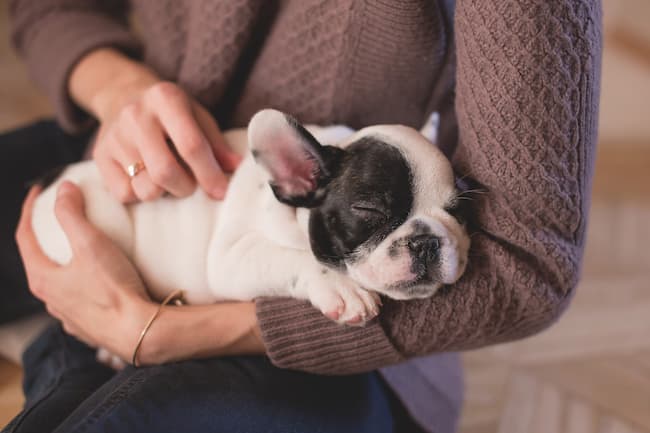
This page can help make those first few days with your new puppy more fun, and less frantic.
Here's a simple guide to what your little guy needs from you, and what to expect from him during the first couple of weeks:
Before The 'Big Day'
Life isn't always predictable (okay, it's never predictable), and if you've bought, adopted or rescued a puppy on impulse then you're not going to be able to get your ducks in a row ahead of time.
That's not a deal-breaker, and you can get the necessary supplies with the new arrival in tow, or rearrange your home/yard/schedule as things develop.
It's safe to say that you'll enjoy your little guy more if you've had a chance to make sure your home/yard is safe for a curious, rambunctious four-legged toddler and you've already stocked up on basic puppy necessities before you bring your puppy home.
Puppy Proofing Your Home & Yard
Puppies are endlessly curious, small enough to wriggle under, through and into things/places you would never have thought of.
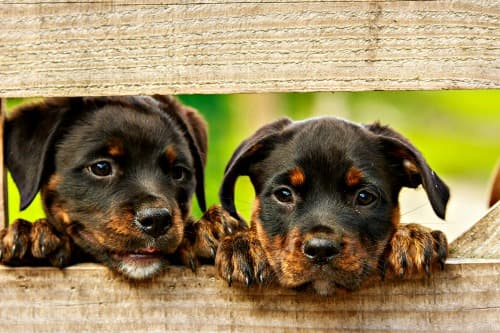
They're also hard-wired to investigate everything with their mouths... and sharp little teeth.
The average home is a minefield of dangers... and that puts both your new puppy and your furniture, rugs and possessions at risk!
Supervising your new puppy whenever he's got free run of the house is the best way to keep him safe, but a little bit of forward planning helps too:
- Keep everything that's remotely chewable (and not nailed down) up out of Rascal's reach
- Protect wires and cables from sharp puppy teeth
- Find out which products, food items and other everyday things are toxic to dogs... and lock them up!
- Make sure your yard is escape proof
- Check yard for toxic plants/trees and avoid using chemicals
- Don't forget to puppy-proof the garage/shed too
Basic Puppy Supplies
Puppies actually NEED a lot less than you might think.... but there's so much cute stuff out there that it's easy to blow your budget in under ten minutes!
So, start with the necessities and only go for the luxuries if there's money left over.
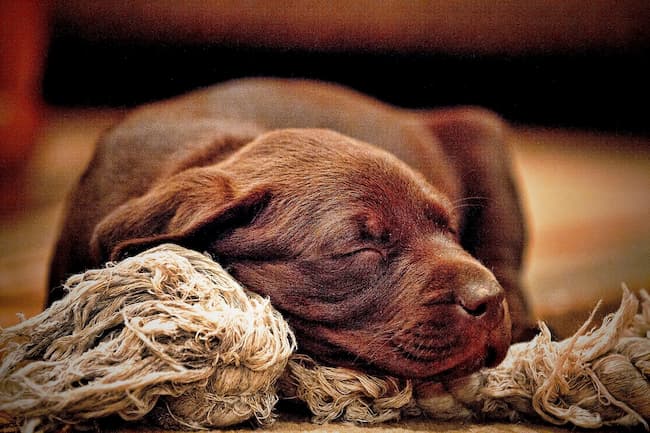
Basic puppy supplies that you need for your little guy include:
- High quality puppy food (premium all-natural commercial, home-made or raw)
- Housebreaking supplies (includes crate and cleaning products)
- Collar, ID tags and leash
- Non-skid or non-tip easy-clean bowls
- Toys that are suitable for puppies
Bringing Puppy Home
Okay, so hopefully you've got all your 'prep' work done and the big day is here!
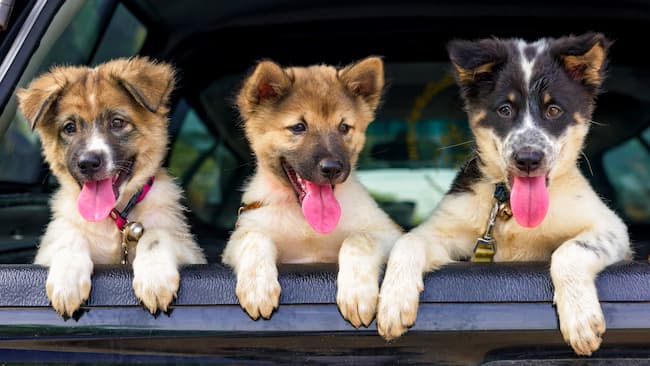
However you're planning on getting your new puppy home, you're likely to be using your car for at least part of the journey.
I'd suggest taking someone else with you on this trip as it will help him to feel better if there is someone to drive and someone to hold him tight (not to mention it's safer than driving with a puppy on your lap!).
If you don't have anyone else to go with you, then take a crate and put him in that while you are his chauffeur.
Some puppies get car sick, so take a roll of kitchen towels, some wet wipes, a plastic bag for trash and a spare blanket or towel with you when you go to pick up your little Rascal.
Even if it's a long drive, don't let your new pup walk around on public ground such as a rest-stop or park.
He has virtually no immunity to disease at this point and he could pick up a deadly illness very easily.
If you're using public transport, keep him up off the ground and don't allow everyone to pet him or fuss over him.
Once home, keep your welcome low key and give your little one time to get over the stress of the trip.
Don't be tempted to bathe him (unless it's absolutely essential) as that's another stress.
High levels of stress can weaken the immune system and sometimes cause diseases such as Coccidia, Giardia or even the deadly Parvovirus (symptoms include watery/bloody diarrhea and/or vomiting) to appear.
If your new pup shows any signs of these symptoms get him to a veterinarian right away. Even if he has health certification that says he's 100% fit.
Parvo is a very common, serious, highly contagious dog illness which can kill a puppy within 24 hours... and if you miss the early symptoms it could cost little Rascal his life.
Your Puppy Meets The Family
Adding a new puppy to your family always causes some kind of upheaval, even the fun stuff takes up time and changes your daily routine.
Do you have other dogs, or children, elderly/frail family members or small pets?
There's an adjustment period for everyone, and although 99% of the time this doesn't last long, it can be a shock if you're expecting your big-happy-ever-after-family-life to start the minute you walk through the front door with Rascal.
Your Older Dog & The New Puppy
If you already have a dog (or more), he/she might not be as thrilled with your new family member as you are!
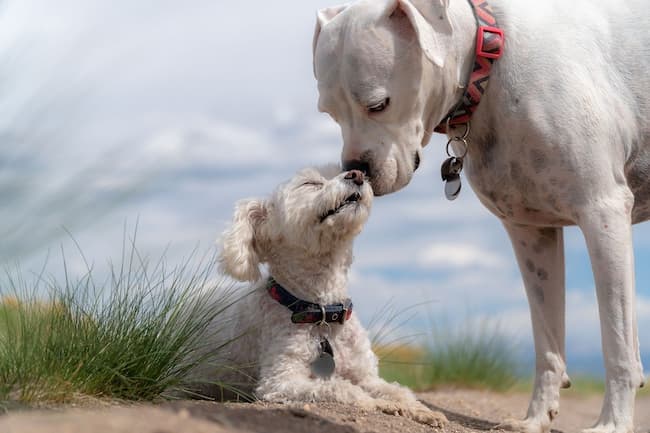
A lot depends on the resident dog's personality.
An easy-going, friendly confident dog may be perfectly happy to have a playmate, or napping partner.
But if your current canine is the prickly, solitary kind or doesn't usually like other dogs too much, you could be in for a bumpy ride.
MOST of the time, an older dog will tolerate your new puppy fairly well, even if they don't love him.
But that doesn't mean that there won't be any squabbles, skirmishes, jealous behavior or just downright crankiness.
The majority of the time, the older dog will put up with the pups antics... up to a point... then he/she will 'draw the line' and will show the little one who's in charge with a growl, snap or other rebuke.
Unless there is a huge size difference, or one of them seems to be getting hurt or really upset (and it's not always the puppy in that position), it's best to try to let them work it out between them.
Only get involved if you're truly concerned.
If you're bringing home an adolescent pup or adult dog, your current dog may not be quite so accepting.
Things usually work out, but it takes time, supervision and patience.
Something worth remembering is that most dogs will get along better with a dog of the opposite sex. Two same-sex dogs are more likely to get into conflicts when they're both mature.
Children & Puppies
Kids and puppies are made for each other and there's nothing sweeter than watching your child snuggle with your new puppy.
But not all matches are made in heaven and if you're looking for a child-friendly pet then it pays to put a little thought into choosing a puppy who will be a good fit for your family.
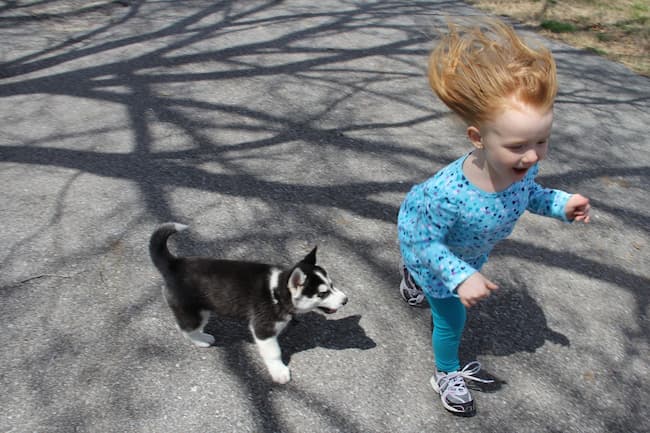
Adult size is not a big consideration when choosing a pup for a family with children.
Although extra large, or teeny tiny, breeds aren't the best choice if you have small children or toddlers, but breed characteristics and the personality of the individual puppy is much more important.
If little Rascal has already spent time around children he will adapt more quickly to a child-centered home.
You'll need to make sure that the puppy isn't overwhelmed with love by excited little ones. That can be very stressful for a pup.
Make the introductions and time spent together sow and easy during the first few days.
Right from the beginning ensure that children understand that Rascal is NOT a toy and needs gentleness, respect and alone time.
Taking Care Of Your New Puppy
You don't need a degree or special training to be a good puppy parent.
Common sense, routine, empathy, patience and love will work just fine.
But a little extra help and advice can make raising your little Rascal a lot less stressful, and a lot more fun, than just going in 'blind'.
Here's what puppies need.....
- LOVE
- A safe environment to grow up in
- A nutritious diet
- Proper veterinary care
- Rewards-based training
- Plenty of exercise
- On-going socialization
- Regular grooming
- Your trust, respect and affection
That adorable little furball in your arms is now 100% dependent on you for everything. He's also like a little sponge... soaking up everything around him and learning all the time.
Don't get so wrapped up in the cuddling and playing that you forget to help your new puppy learn about how to live in our human world and what is expected of him.
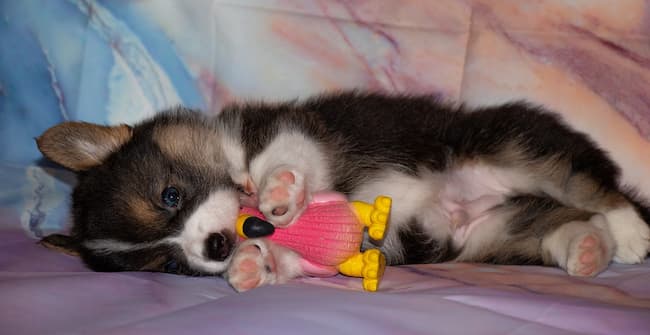
Also try to rein in your expectations and remember that your new puppy is a tiny baby.
You wouldn't expect a human baby to go straight from diapers to using the toilet overnight, so don't expect Rascal to be potty trained in a week!
Gently but consistently show and teach him what behaviors are acceptable. He wants to please you, but his only experience of the world is in a doggie family and he'll need time to learn that things are a little different now.
Puppies thrive on routine and repetition.
Having a predictable daily schedule helps your pup feel safe and secure.... it also helps with potty training.
Several short training sessions each day are much better than one long one (remember, repetition is the key), and socialization needs to be a part of his everyday life.
You Might Also Like:
- Home
- Your New Puppy



